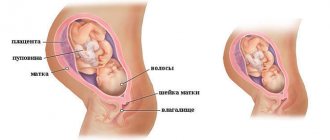17.07.2020 10787 0
Waiting for a baby is an exciting state, causing a lot of anxiety and worries. The eighth week of pregnancy is almost two months of bearing a child, and it is during this period that the embryo begins to be officially called a fetus. During these months, it develops especially actively: future features are laid, internal organs are formed. Therefore, the mother also needs to be attentive to her condition.
Body changes and new sensations for women
A woman who has realized her new position and accepted it changes her attitude towards herself and others.
Now, at 8 weeks of pregnancy, the most important thing for her is not problems at work, not quarrels with her mother-in-law, but the health of the unborn baby. Mental changes have a positive effect on the physical state: nausea and vomiting no longer cause panic, they occur less and less frequently, and sudden mood swings are replaced by a feeling of long-awaited calm (if, of course, it is not disturbed by premature “verdicts” of not the best and competent specialists). But there are troubles that really await a pregnant woman at this time - they are associated with the pressure of the growing uterus on the sciatic nerve and bladder. In the first case, unpleasant sensations may appear in the lower back, thighs or buttocks (the doctor will prescribe medications that will help the woman), and in the second, urination becomes more frequent. To cope with the last scourge, the expectant mother must exclude from her diet drinks that have diuretic properties (sparkling water, caffeine-containing drinks).
Mom's well-being
As mentioned above, it is almost impossible for others to suspect from the outside that a woman is eight weeks pregnant, although particularly vigilant and attentive friends and colleagues may still notice some changes - for example, the expectant mother goes to the toilet more often and sometimes suffers from sudden attacks poor health and mood.
“Due to the growing uterus, slight pulling sensations may appear in the lower abdomen, a more frequent urge to urinate, and in some cases, dyspeptic disorders may occur,” explains Maria Prokhorova.
In addition, Maria Viktorovna says that this period is characterized by some changes in the emotional background, since a woman, as a rule, is psychologically attuned to the role of a future mother. Even in cases where an unplanned pregnancy came as a surprise, by this time the first shock from the good news recedes, giving way to completely different feelings - the realization that a small life is growing inside, for which you need to be responsible not only after birth, but also all subsequent ones. months. Nevertheless, her mood may still remain unstable, causing her and those around her inconvenience due to excessive impressionability, irritability and tearfulness, which are characteristic of some pregnant women.
Despite the fact that the belly is not yet noticeable, some changes in appearance still occur. Already at such an early stage, the breasts, under the influence of rapidly changing hormonal levels, begin to prepare for subsequent breastfeeding, and many women notice that their usual underwear feels a little tight as the mammary glands increase in size and become more sensitive.
However, for most, such changes in appearance are for the better. The same cannot be said about the faithful companion of a fairly large percentage of pregnancies (but, fortunately, not all) - toxicosis. Excessive sensitivity to odors, rejection of previously favorite aromas and tastes, attacks of nausea, sometimes accompanied by vomiting, increased salivation - all these unpleasant symptoms sometimes accompany the expectant mother throughout the entire first trimester. Maria Prokhorova reassures that mild toxicosis does not pose a threat to either mother or baby, but advises consulting a doctor if its manifestations intensify and vomiting becomes repeated, depriving the body of the opportunity to receive all the necessary substances from food.
Another fairly common “symptom” of pregnancy is a constant feeling of fatigue and drowsiness during the day, even after a long and full night’s sleep. The expectant mother literally falls asleep on the go. This condition is also a consequence of hormonal changes and should not be a cause for concern. If possible, do not resist the urge to take a nap. A day's rest will only benefit the body and will most likely help avoid dizziness and weakness.
According to experts, expectant mothers should not worry about a slight increase in temperature in the absence of other symptoms of ARVI. Active hormonal changes and increased work of all body systems can lead to the thermometer showing 37 or even 37.3 instead of the usual 36.6. At the same time, this jump will not affect your well-being in any way. If the rise in temperature is accompanied by a cough, sore throat, runny nose, headache, body aches, then the pregnant woman should see a doctor as soon as possible and under no circumstances self-medicate. It is especially important not to take any medications before consulting a specialist, since many medications are contraindicated during pregnancy!
pixabay.com/
Weight gain
During this period, a woman gains about 0.2–0.5 kg per week. And if she suffers from attacks of nausea (toxicosis during pregnancy is a common phenomenon), she may even lose weight. The total increase over two months of an “interesting situation” for a woman with normal body weight is about 1 kg. However, in this matter one cannot discount the genetic constitution of a person. It is clear that women who are prone to obesity will gain weight more than thin women. This state of affairs should not be scary.
Examinations and tests
If a woman who took a pregnancy test and received a positive result at this time has still not reached the doctor, then now is the time to do so. An obstetrician-gynecologist will perform a visual examination, prescribe all the necessary tests and, if necessary, refer you for an ultrasound. It is impossible to detect the presence of any abnormalities in the development of the fetus in the eighth week of pregnancy (this is done at the first screening at 11-13 weeks), but the study will help make sure that the baby has a heartbeat and rule out a frozen pregnancy. Perhaps they will even give you the first photo of your baby, but you will hardly be able to see the details on it.
When registering for pregnancy, the expectant mother will need to undergo a number of laboratory tests. The mandatory list includes a smear to diagnose vaginal microflora, a urine test, a general and biochemical blood test, blood for HIV, syphilis, hepatitis, determination of blood group and Rh factor. In addition, the doctor who will manage the pregnancy will offer to do an ECG and undergo examinations by specialized specialists: an ophthalmologist, dentist, endocrinologist and others, if such a need is identified.
pixabay.com/
Mom's belly
At week 8, the uterus becomes the size of a lemon, but the belly of the expectant mother increases by an average of 3–5 cm. The old jeans already have difficulty meeting at the waist, and a tight blouse emphasizes the slightly rounded tummy. At 8 weeks it may still hurt - this is normal for the first trimester of pregnancy. The pain occurs because the ligaments that connect the bones are stretched. More often, unpleasant sensations occur on the right side, since the embryo stretches the uterus in this direction. A woman will benefit from a warm bath or lying on her side. Does the pain not go away, but only gets worse? Consult your doctor and find out the causes of unpleasant symptoms.
Useful advice for an expectant mother
The baby's body is formed from the mother's egg and the father's sperm, so it is half a foreign organism for the woman.
In order not to reject the “alien”, the expectant mother’s body reduces its immune defense. Therefore, the words “you need to take care of yourself” will have to be made a motto before, during and after the birth of the Baby. You can identify a decrease in immunity by a feeling of chronic fatigue and pain. So that it doesn’t take you by surprise, start strengthening your body in advance.
- Tune in to the process of self-healing of the body, in any case, do not slow it down. An attempt to get rid of unpleasant sensations using medical methods can serve as a brake. To begin with, what is happening (for example, drowsiness, nausea, irritability) must be accepted as a kind of “requirements” of the Baby with regard to mother’s rest, nutrition, and lifestyle. When these simple “requirements” are met, many sensations disappear. However, if they appear over a long period of time and intensify, then the Baby needs help and should consult a doctor.
- Get more sleep: sleep at least 8 hours daily. It makes sense to go to bed no later than 23:00: the sooner you begin to accustom your Baby to the correct sleep-wake schedule, the greater the chance that he will not “confuse day and night” in the first months after birth. In addition, his nervous system, if he follows the regime, will be stronger, which means his overall vitality will be higher.
Nutrition at 8 weeks of pregnancy
A pregnant woman should eat not twice as much, but several times better! Prohibited are drinks with a high caffeine content, fried, salty, very spicy, fatty foods, preservatives and fast food. However, nutrition during pregnancy should not be monotonous. Dietary meat, cereals, cottage cheese, kefir, vegetables and fruits are the undisputed leaders in the ranking of the healthiest foods for pregnant women.
If before pregnancy you sometimes allowed yourself to drink a glass of wine, don’t risk it now! Replace the alcoholic drink with a delicious vitamin cocktail. Add plain yogurt and a peeled piece of mango to freshly squeezed orange juice. Mix all ingredients using a blender. The drink will be a useful addition to dinner.
Frequently asked questions on the forums
1:
Q: Is it possible to eat salty and pickled foods during the 2nd month of pregnancy?
O.: It is possible. Doctors do not impose any prohibitions on salty foods. The only thing is that you don’t need to get carried away with it. Remember that now you are responsible for the life and health of your baby, and now he needs not pickles, but calcium and vitamins.
2:
Q: Thrush at 8 weeks. How to treat? Is it possible to use pimafucin?
A: At this stage, any medications negatively affect the development and health of the child. Do not self-medicate under any circumstances! Consult a doctor, he will prescribe acceptable treatment. You can temporarily relieve itching and discomfort by douching and washing with a soda solution.
3:
V.: Fainted at 8 weeks. Why did it happen?
A: Dizziness and fainting are possible in the early stages, this is a fairly common occurrence. Check your blood pressure; it may be low, which is what caused the fainting. To avoid recurrence, spend more time outdoors, get enough sleep, don’t overload yourself and eat well.
Sex at 8 weeks pregnant
If there is no threat of miscarriage, do not push your partner away - intimate intimacy (preferably without sexual toys - this is now unnecessary!) and subsequent orgasm will not bring any harm to your baby. Sex during pregnancy is not canceled! However, starting from this time, you should avoid any pressure on the stomach (even if it is almost invisible), as well as sudden and very deep penetrations into the vagina. Make love calmly, without experiments - leave them for the postpartum period.
Lifestyle
No troubles should disturb a measured way of life: the main thing now is your child, and problems can wait! Avoid strenuous physical activity, avoid frequent trips to the sauna due to the risk of miscarriage, do not take antibiotics, beware of exposure to chemicals and fumes, reschedule your planned trip to a later date (the first trimester is the most dangerous time, according to doctors, for flying and climate change). And if you feel that something is wrong with you, be sure to consult a specialist. Don’t be afraid to seem boring and intrusive - after all, now we are talking about the health and safety of the baby, which means that all your questions should be taken with understanding by the doctor!
Checklist for the eighth week of pregnancy
- Choose qualified gynecologists and other specialists. It is important that you get along with your doctor, trust his opinion and share his approach to managing your pregnancy.
- Review your wardrobe: you may find loose, non-tight clothes more comfortable. It is also worth choosing a special bra for pregnant women.
- Create a ritual of weekly weigh-ins: at the same time, in approximately the same clothes. This will allow you to objectively monitor your weight gain.
- To prevent ARVI, avoid places with large crowds of people, ventilate your home and work more often, get vaccinated before the epidemic season: it is absolutely safe during pregnancy.
Be attentive to yourself: if you are bothered by some new sensation or have anxiety, it is better to play it safe and ask a doctor for an opinion. Let us remind you that by concluding a contract for pregnancy management at the Women's Medical Center, you have the opportunity to contact a gynecologist at any time convenient for you.
Beauty and accessories
It's time to seriously think about shoes with flatter soles and loose-fitting blouses. Avoid skinny jeans and heels. And remember: pregnancy is not the best time for experiments. There is no need to suddenly change your image now, dye your hair green, get a new tattoo or remove an old one. There are already a lot of changes in your life, it’s better to take care of yourself and your unborn baby, protect him from possible negative influences.
To prevent stretch marks, rub olive oil into the skin of your stomach, and special creams will help with stretch marks on your chest. And don’t be afraid that your skin will suddenly become very dry and your hair brittle - these troubles (they are based on hormonal changes) are temporary!
What happens to the child
The embryonic stage of development has come to an end, and from the 8th week the embryo is called a fetus. By the end of this week its size will be 3 cm, and its weight will be about 4 g.
The period of the most intense processes is already behind us. All the main organs and systems have been laid down; their development and improvement will continue.
The musculoskeletal system of the fetus is already sufficiently formed, but the process of replacing cartilage tissue with bone tissue will still continue.
At the 8th week, the formation of the ears, fingers, elbow joints, heart is completed, and the diaphragm appears. The male fetus begins to produce testosterone.
During this period, the fetus is already freely “floating” in the amniotic fluid. Changes occur in the fetal blood that determine the blood type of the unborn child.









